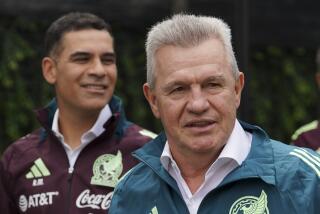Qualifier Is Served Ice Cold
COLUMBUS, Ohio â There is no truth to the rumor that Jorge Campos will run onto the field at Crew Stadium tonight dressed in a bright orange electric blanket and trailing a long cord.
âMaybe it will be better tomorrow,â Mexicoâs shivering goalkeeper said after practice Tuesday morning.
Not much chance of that. Itâs going to be colder tonight, and temperatures dipping below freezing are a distinct possibility. Just to make things even more uncomfortable for Campos and company, snow flurries are predicted.
Welcome to Ohio in late winter, Mexico. Welcome to what the United States calls its home-field advantage--a small but sold-out soccer stadium alongside Interstate 71 on a raw night in February.
Gloves are mandatory. Flasks are optional.
A local Spanish-language weekly summed it up perfectly in a headline: âLa Guerra Friaâ--the Cold War.
On one side, Mexico, long the dominant force in menâs soccer in this part of the world. Its all-time World Cup qualifying record against the U.S.? A chilling 13-2-4 since 1934.
On the other side, a U.S. team intent on reaching the 2002 festivities in Japan and South Korea and erasing the last-place stain of the France â98 World Cup.
âThe colder the better,â said U.S. midfielder Chris Armas.
Well, maybe not, said defender Jeff Agoos.
âYou donât want a situation where itâs freezing cold and windy and snowing,â he said. âIt just takes away from both teams and really takes away from the game itself.
âI think a nice crisp, cold evening would be great.â
And while Mexico has its collective eye on the clouds, the U.S. is eyeing the stars, specifically, Luis Hernandez and Jared Borgueti.
Those are the Mexican forwards the Americans will have to stop if they are to have a chance of starting their qualifying campaign on a winning note.
âThe biggest concern we have with Mexico and their attack is dealing with Luis Hernandez,â U.S. Coach Bruce Arena said.
âHeâs a dangerous player; heâs very good in counter[attacking] situations, heâs very good at positioning himself in front of the goal and getting chances for himself and others.â
Hernandez arrived in Ohio nursing a strained hamstring, but Enrique Meza, Mexicoâs coach, said Tuesday that the player had responded well to treatment and would be fine.
Hernandez practiced without any noticeable problem Tuesday and the idea that he might miss the game was scoffed at by Agoos.
âIf I were a betting man, Iâd say heâll be playing,â Agoos said. âLuis is they type of guy who likes big games and I think heâll do everything to play in this game.â
Borgueti is more of an unknown quantity, having played only nine games for the national team. Still, Agoos respects what he has seen of him.
âHeâs sort of a classic target man,â Agoos said. âHe plays very well with his back to the goal. Heâs a pretty big guy, good in the air. Heâs a guy whoâs probably not going to beat you with his speed or a whole lot of skill, but heâs a guy whoâs always in front of the net and can score if youâre not real careful.
âBecause Hernandez is kind of a quick guy, who works well off him and gets into spaces, they play very well together.â
Whichever team wins tonight, qualifying will continue until Nov. 11 and the question will still be: How many points will it take to get to Japan and South Korea? What is the magic number for the six teams in this qualifying group?
Only 32 elite nations from an original field of 198 countries will make it to Asiaâs first World Cup. Three of them are known--defending champion France and hosts Japan and South Korea.
The 29 others will come from qualifying tournaments underway in Africa, Asia, Europe, South America and Oceania.
And here.
Three will emerge from this North and Central American and Caribbean (CONCACAF) group, which includes, besides the U.S. and Mexico, Costa Rica, Honduras, Jamaica and Trinidad and Tobago. But only after a trying series of 30 qualifying games.
âWe know 30 points will get us there,â Agoos joked the other day. âThatâs really the goal. If we get 30, Iâm pretty sure weâll get there.â
No doubt, but with each team playing 10 games, and with three points for a victory, one for a tie and none for a loss, 30 is a number that occurs only in dreams.
When Mexicoâs team arrived at its hotel here Monday night, Meza didnât even make it through the lobby before he was directed to a chair behind a table covered with microphones.
The question was in Spanish, but the gist was clear from the answer.
âEighteen,â Meza replied.
That, apparently, is the number of points Meza believes will get Mexico to the World Cup. And it can be achieved through five home victories--almost a given in Mexicoâs case--and by grabbing a win or a few ties on the road.
None of the five other competitors has the advantage that Mexico has of playing at high altitude, in sometimes choking smog, before 120,000 screaming fans at the giant bullring known as Azteca Stadium in Mexico City.
Mexico will get its points. Itâs up to the others to see if they can keep pace.
âI think the minimum last time around [in qualifying for the 1998 World Cup in France] was 15 points,â Arena said. âI think the group is going to be closer this time around, so maybe somebody with 13 points gets through. I really donât know.â
If every team won its home games and lost its road games, every team would have 15 points. So what it essentially comes down to is, which team can spring some upsets on the road.
Teams go out of their way to give themselves every advantage at home. Fans do all they can to support that effort, even to the extent of showering opposing players with abuse and debris and trying in every possible way to throw them off their game.
It happens to Americans in Costa Rica, to Costa Ricans in Honduras, and to Jamaicans in Mexico. Everyone is fair game in the unfair game.
Coming to the U.S., by comparison, is a trip to Disneyland for CONCACAF teams. Half-hearted booing is easily ignored.
The U.S. does what it can to throw opponents off stride. Thus, playing Mexico in Columbus in the winter at a small stadium that will be overwhelmingly--in theory at least--populated by American fans.
âIâve been playing with the national team for 15 years and I can probably count on one hand how many times weâve had a pro-American crowd,â Agoos said. âItâs unfamiliar ground. Weâre just not used to it.â
Besides tonightâs game here, the Americans will play their home qualifiers in Kansas City, twice in Foxboro, Mass., and Washington.
Five home victories might be enough to get them to Japan and South Korea. But each game that isnât won at home means one that has to be won on the road, where even ties are difficult to achieve.
That applies to the five other countries as well, of course, and it will be awhile before the dust settles.
âWeâre thinking that itâs probably going to get down to the next-to-last game or the last game,â Agoos said. âI think it would be a rare occurrence if we qualify before that. There are six really difficult teams.â
The U.S. team held its final practice here Tuesday night, trying to duplicate, as closely as possible, the frigid conditions they will experience tonight.
The cold, apparently, will be shrugged off.
âIf the weatherâs lousy, we can live with that,â Arena said.
Meza agreed, saying, âThe players will not be affected by the temperature.â
Try telling that to Jorge Campos. Perhaps he had better bring that electric blanket after all.






